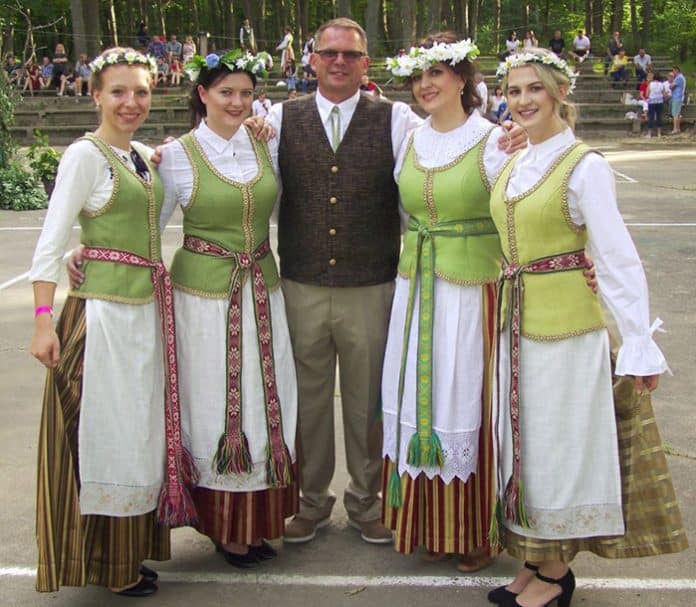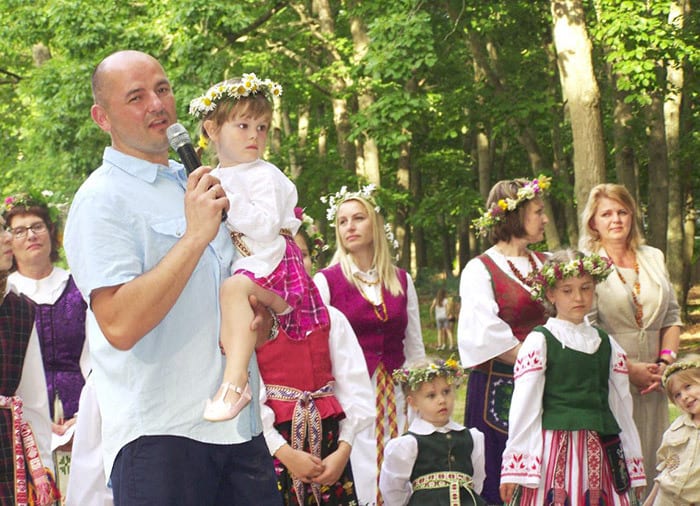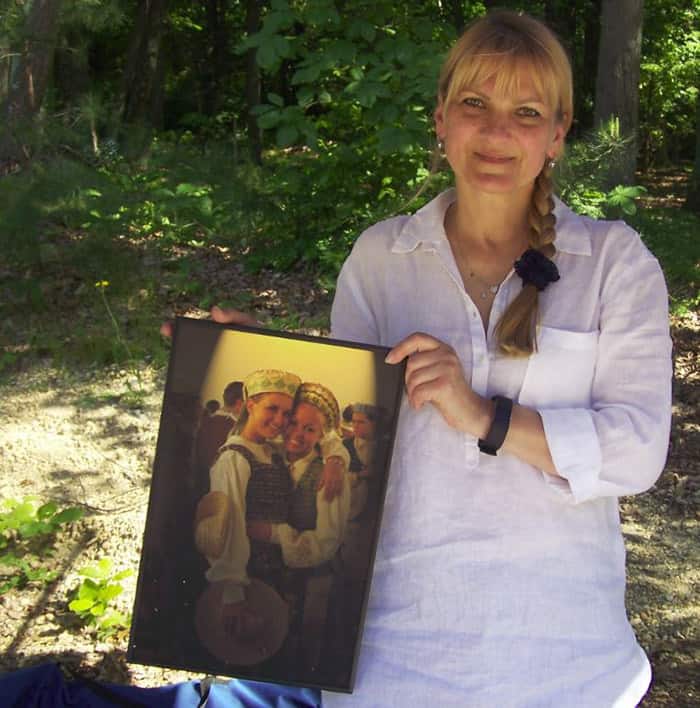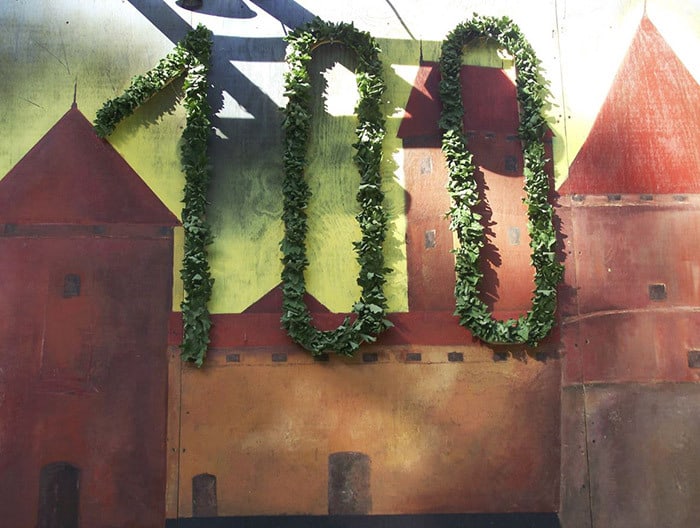
JACKSON – Nearly hidden at the borderline of Jackson and Lakewood is the Lakewood Estonian House located at 4 Cross Street and East Veterans Highway. While it is actually based in Jackson, the Lakewood Estonian House has provided the perfect setting for the 9th Annual Lithuanian Festival.
The event, coordinated by the Central New Jersey chapter of the American-Lithuanian Community Inc. organization celebrated Saint Jonas’ Day also known as Rasos (Dew Holiday), Joninės, Kupolė, Midsummer Day or Saint John’s Day all of which is a midsummer folk festival celebrated in Lithuania. The festival, which drew several hundred people, included many Lithuanian traditions including a native dinner, singing songs and dancing.
Officially known as the Republic of Lithuania, it is a nation located in the Baltic region of northern-eastern Europe. Lithuania is bordered by Latvia to the north, Belarus to the east and south, Poland to the south, and Kaliningrad Oblast (a Russian exclave) to the southwest and has an estimated population of 2.8 million people as of 2017.

Jackson resident Kostas Mastauskas is the new president of the organization. “This has been going on for nine years now and it brings many people together for a celebration of our culture,” he said.
Aurelia Lawmiczak, a resident of Manchester Township, is Polish, but a friend persuaded her to come to the event for the first time and to learn more about the customs, food, drink and dancing of Lithuania. “Like the Estonians, the Lithuanians are a very quiet, peaceful people. My friend wanted me to see some of the differences in our cultures.”
Lawmiczak admitted to not knowing a lot about Lithuania but did note that Polish sausage and pierogis were a regional favorite of Lithuanians and their neighbors. Borscht, a cold beet soup, was another favorite of the region which is usually identified with Russia.
In her pursuit to learn more, Lawmiczak visited some of the vendors that were present which included photographer Laima Reiss. Reiss, a native of Lithuania, was selling copies of her books and photographs. She described her native land as “a mix of everything.”
“I lived in the capital city of Lithuania, which is Vilnius,” Reiss said. Vilnius is also the largest city in Lithuania. The nation’s official language, Lithuanian, along with Latvian, is one of only two living languages in the Baltic branch of the Indo-European language family. Many in attendance spoke the language during the festival.
Moving on to the Linos Lithuanian Food stand operated by Lina and Andrius Stanioniene of Toms River, Lawmiczak tried a sample of rugine duona, what is traditionally known as the centerpiece of Lithuanian cuisine. Andrius Stanioniene said this dark rye bread was used more often than light wheat breads.

“It is baked with no yeast whatsoever and made with sour dough and it takes 24 hours just to prepare the dough,” Stanioniene said.
He added that the bread needs to be made very carefully in a quiet place. “No vibrations, no loud music just a nice quiet environment. Lina and I are trying to expand our business. We would love to share our culture and open a restaurant. We have been doing these types of events since 2005.”
While Linos Lithuanian Food offered up bread, sausage and other delights, Morius Braskus traveled all the way from Massachusetts with his vendor truck to provide some sweets.
Braskus was selling sweet cheese bar vanillin. “It is a new product that some may find similar to cheesecake.” His stand also offered up some fresh cheeses.
Egle Cabanas, the organization’s treasurer and the official photographer for the event was enjoying the day with her sons, Jonathan, 4, Julian, 7, who were having their faces painted by Nicole Verbejus, Jackson.
Cabanas said St. Jonas Day/Rasa Day, the dawn day celebration marking the longest day/shortest night of the year is normally held on June 24 and that the celebration “comes from a mix of Christianity and Paganism. It is celebrated in some towns in Pennsylvania. Lithuania was one of the last countries in Europe to convert from pagan beliefs to Catholic Christian beliefs.”

The special guests of the day included Lithuanian-American Community Inc. national president Siqita Simkuvieni who said the organization “has 52 chapters and we are invited to many festivals like this and we also get involved in political activities.”
Julius Pranevicius, the Counsul General of the Republic of Lithuania in New York was also present, noting this was one of his favorite festivals to attend. “This is a lot of fun. During the 20th century Lithuania was occupied three times, first by the Soviets, then the Nazis and then the Soviets again. After World War II, many fled but some remained and went into the forest to form a resistance even knowing that the Soviets had far superior weapons, equipment and soldiers. They knew they would have no possibility to win freedom, but they stood together with hope.”

Pranevicius said that this year marked the 100th anniversary of Lithuania in “re-establishing itself as a country.” Toward the end of World War I, Lithuania’s Act of Independence was signed on Feb. 16, 1918, declaring the founding of the modern Republic of Lithuania.
On March 11, 1990, a year prior to the formal dissolution of the Soviet Union, Lithuania became the first Baltic state to declare itself independent, resulting in the restoration of an independent State of Lithuania after 50 years of Soviet occupation.
“Lithuania is a member of the European Union, and economically it is doing very well,” Pranevicius said. “Twenty years ago it was a country undergoing transformation but now it has settled down to be more of usual European country with the same language, music and habits. Our history is very rich.”







